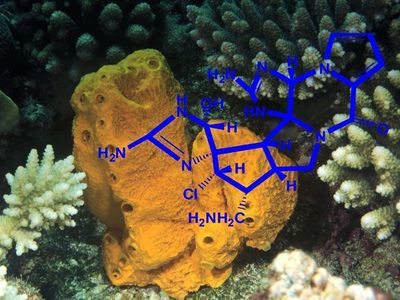Difference between revisions of "Marine Biotechnology securing Human Health"
(ref) |
(→References) |
||
| (4 intermediate revisions by 2 users not shown) | |||
| Line 1: | Line 1: | ||
In recent years, the chemistry of natural products derived from marine organisms has become the focus of a much greater research effort. Currently there are several products already on the market and around 15 marine natural products in various phases of clinical development, mainly in the oncology area, with more on the way. Nevertheless, the seas and oceans represent a huge potential source of new drugs, innovative treatments and diagnostic tools for human and animal health. | In recent years, the chemistry of natural products derived from marine organisms has become the focus of a much greater research effort. Currently there are several products already on the market and around 15 marine natural products in various phases of clinical development, mainly in the oncology area, with more on the way. Nevertheless, the seas and oceans represent a huge potential source of new drugs, innovative treatments and diagnostic tools for human and animal health. | ||
| − | {| | + | {|margin style="float: right; text-align:center; font-size:85%; margin-left: 1em;width:400px" |
|[[Image:mbt_health.jpg|400px]] | |[[Image:mbt_health.jpg|400px]] | ||
|- | |- | ||
| Line 10: | Line 10: | ||
| − | == | + | ==Examples of Marine Biotechnology research for Human Health== |
* [[Marine derived anticancer drugs]] | * [[Marine derived anticancer drugs]] | ||
| Line 18: | Line 18: | ||
| − | == | + | ==Research priorities and objectives == |
| + | '''Overarching research target:''' | ||
| + | |||
| + | Development of novel drugs, treatments and health and personal care products. | ||
| + | |||
| + | '''Key research priorities:''' | ||
| + | |||
| + | * Increase the focus on the basic research (taxonomy, systematics, physiology, molecular genetics and (chemical) ecology of marine species and organisms from unusual and extreme environments to increase chances of success in finding novel bioactives; | ||
| + | * Improve the technical aspects of the biodiscovery pipeline, including the separation of bioactives, bio-assays that can accommodate diverse material from marine sources, dereplication strategies and structure determination methods and software; | ||
| + | * Overcome the supply problem to provide a sustainable source of novel pharmaceutical and healthcare products through scientific advances in the fields of aquaculture, microbial and tissue culture, chemical synthesis and biosynthetic engineering. | ||
| + | |||
| + | ==References== | ||
| + | |||
| + | <references/> | ||
| + | [[Category:Key Marine Biotechnology application areas]] | ||
Latest revision as of 13:11, 7 November 2013
In recent years, the chemistry of natural products derived from marine organisms has become the focus of a much greater research effort. Currently there are several products already on the market and around 15 marine natural products in various phases of clinical development, mainly in the oncology area, with more on the way. Nevertheless, the seas and oceans represent a huge potential source of new drugs, innovative treatments and diagnostic tools for human and animal health.

|
| The sponge Stylissa massa produces an unusual compound palau'amine, with antimicrobial activity. [1] |
The main challenges facing pharmaceutical discovery from marine bioresources are linked to: legal aspects (secure access to marine resources and intellectual property rights); quality of marine resources (identification and variability); technology (screening of active compounds and replication, preventing repeated rediscovery); and structural costs of drug discovery from natural products.
Examples of Marine Biotechnology research for Human Health
- Marine derived anticancer drugs
- Marine derived painkillers
- Marine derived antibiotics
- Marine derived cosmetics
Research priorities and objectives
Overarching research target:
Development of novel drugs, treatments and health and personal care products.
Key research priorities:
- Increase the focus on the basic research (taxonomy, systematics, physiology, molecular genetics and (chemical) ecology of marine species and organisms from unusual and extreme environments to increase chances of success in finding novel bioactives;
- Improve the technical aspects of the biodiscovery pipeline, including the separation of bioactives, bio-assays that can accommodate diverse material from marine sources, dereplication strategies and structure determination methods and software;
- Overcome the supply problem to provide a sustainable source of novel pharmaceutical and healthcare products through scientific advances in the fields of aquaculture, microbial and tissue culture, chemical synthesis and biosynthetic engineering.
References
- ↑ Cayman Islands Twilight Zone 2007